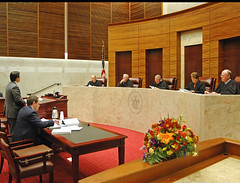 What is Christianity all about in 25 words or less (just kidding about the 25 words)
What is Christianity all about in 25 words or less (just kidding about the 25 words) If you were to ask the average person what Jesus' preached - even the average Christian - you'd no doubt hear something about love: "Jesus taught about love. He said we should all love each other." This perception of Jesus' teaching isn't wrong, let me hasten to add. Jesus did talk quite a bit about love. In fact he said that loving God is the greatest commandment and loving our neighbors is the runner up (Mark 12:29-31). So, to be sure, love figured prominently in the message of Jesus.
But love was not the core of his proclamation. And, to be sure, his preaching about love didn't get Jesus crucified. Neither the Romans nor the Jewish authorities would have been particularly bothered by a Jewish prophet who ran around telling people to love God and people. Quite a few Jews would have been distressed over the thought of having to love their enemies, however. But the Romans - the obvious enemies -- wouldn't have crucified someone whose main crime was telling Jews to love them and turn the other cheek! The core of Jesus' message must have been more contentious, indeed, more scandalous, than a call to love.
It's common for people to reduce the message of Jesus to something all too simple and, I might add, all too similar to the biases of whoever is doing the reducing. You'll see this in many of the contemporary "scholarly" attempts to summarize the message of Jesus. The infamous Jesus Seminar, by the time it stones Jesus to death with its red, pink, gray, and black beads, ends up with a sage who speaks in esoteric riddles, hardly someone who would be put to death as a threat to Roman order in Judea.
Whatever Jesus preached, it got people excited. Even the demons were riled up. And Jesus' message angered most of the religious leaders he encountered. In the end, it got him killed on a Roman cross. So what exactly was this inspiring, challenging, goading, and apparently subversive message of Jesus all about?
What Jesus actually proclaimed, first and foremost, was not that we should love, but something else. We find a succinct summary of this "something else" in the first description of Jesus' ministry in the Gospel of Mark: "Now after John was arrested, Jesus came to Galilee, proclaiming the good news of God, and saying, 'The time is fulfilled, and the kingdom of God has come near; repent, and believe in the good news'" (Mark 1:14-15). Here, in a nutshell, is the message of Jesus:
the kingdom of God has come near.I cannot tell you how many times in the last thirty years I've heard people locate the kingdom of God in human hearts. Christians do it, and so do many New Agers. Their credo is "The kingdom of God is within you" (Luke 17:21). But they missed Jesus' own meaning by a mile.
Yes, to be sure, God's reign will touch human hearts. But it is not limited to some kind of internal, subjective experience. Yes, I know Jesus is quoted as saying that "the kingdom of God is within you," but this verse is usually wrenched way out of context. Let's return to the passage from which this line comes:
Once Jesus was asked by the Pharisees when the kingdom of God was coming, and he answered, "The kingdom of God is not coming with things that can be observed; nor will they say, 'Look, here it is!' or 'There it is!' For, in fact, the kingdom of God is entos hymon" (Luke 17:20-21).
I've left the original Greek untranslated for a moment so we can see the context of this phrase without prejudging its meaning. Jesus is speaking, not to his faithful disciples, but to a group of Pharisees. They expected the kingdom of God to come with great signs, most obviously the beginnings of a successful revolt against Rome. But Jesus says their expectations are misguided. In fact, the kingdom of God is entos hymon. Given what Jesus says about the hearts of the Pharisees elsewhere - that are "full of greed and self-indulgence" and "all kinds of filth" (Matt 23:25, 27) - it's unlikely that Jesus is telling the Pharisees to look within their hearts to find the kingdom. Rather, he is saying to them: The kingdom of God is right here, in your midst. The Greek phrase entos hymon can mean "among you," as it does in this instance. If the Pharisees want to find the kingdom, Jesus says, they should look, not into their own sinful hearts, but right in front of their eyes, at Jesus himself, at his words and works.
So, though God's reign embraces and transforms human hearts, it is not limited to some sort of interior experience. The kingdom of God impacts actions, thoughts, relationships, families, institutions, and governments. In the end, it will touch everything on earth, when God's will is done on earth "as it is in heaven." Yet this expansive kingdom has begun on earth in a most unexpected and unnoticed way - rather like a mustard seed -- in the ministry of Jesus.
If the kingdom of God is neither up in heaven nor limited to human hearts, but is something we ought to experience in all aspects of our earthly life, this points to another question: When is it coming? Did Jesus envision the kingdom of God as present reality? Or was it rather something that was coming in the future?
What Was the Core of Jesus’ Message?1. The core of Jesus’ message was the proclamation of the coming of the kingdom of God: “The time is fulfilled, and the kingdom of God has come near; repent, and believe in the good news” (Mark 1:14-15).
What is the Kingdom of God?
The English phrase “kingdom of God” translates a Greek phrase from the gospels that refers not so much to the place where God rules as to the presence and power of God’s actual rule. The kingdom or reign of God is here when God is exercising his authority on earth.
How Did Jesus Proclaim the Kingdom of God?Jesus proclaimed the kingdom of God in words (basic statements of fact, explanations, parables) and in works (healings, exorcisms, nature miracles, other symbolic gestures). What Jesus said, he did. This not only illustrated the truth of his proclamation, but it also drew the people to him.
Where is the Kingdom of God?
Contrary to popular perceptions, the kingdom of God is not primarily in heaven or our hearts, but in all dimensions of reality. God’s reign impacts actions, thoughts, relationships, families, institutions, and governments.
When is the Kingdom of God Coming?Jesus proclaimed the kingdom of God as something present in his ministry, and also as something that was still to come in glory. Thus the kingdom is not either present or future, but both present and future. It is the “already and not yet kingdom.” It’s is already here, and not yet fully here. Thus it is rather like an engaged couple, a pregnant mother, or a finished but not quite yet graduated doctoral student.
How is the Kingdom of God Coming?According to Jesus, the reign of God will not come through a Jewish revolt against Rome. Though he agreed with his Jewish contemporaries who looked forward to the coming of an anointed deliverer, Jesus conceived of the work of the Messiah in radically unexpected terms. Rather than conquering the Romans through force, Jesus, as Messiah or Son of Man, would die on a Roman cross. Through this sacrificial action he would take God’s judgment upon himself, offering his life as a ransom for many. The new exodus, God’s new act of salvation, was taking place in Jesus, and would be culminated in his passion and resurrection.
How Does the Message of Jesus Lead to Crucifixion?Throughout his ministry, Jesus consistently upset many of the religious and political leaders of the day. His proclamation of the kingdom through words and works made him a marked man, both because he contradicted many of the core values of his opponents, and because he undermined their popular impact. But when Jesus “cleansed” the Temple in Jerusalem, this was the last straw. He became a clear and present danger, not only to the Pharisees in Galilee, but to the priestly hierarchy in Jerusalem, and to the Temple, the core institution of Judaism, and to the fragile peace of Judea. Thus he threatened the social order so essential to Roman domination. The leaders in Jerusalem, both Jewish and Roman, sought to crucify Jesus, both to get him out of their way and to warn others not to follow in his footsteps.
Closing Thoughts: How Do We Follow Jesus?If Jesus came to inaugurate the reign of God on earth, if he proclaimed this message in words and works, and if, in the end, this message led him to the cross, then how do we who believe in Jesus follow him today? Let me offer a few brief suggestions:
1. We should seek to live each moment in the reality of the kingdom of God. Jesus said, “The kingdom of God has come hear; repent and believe in the good news” (Mark 1:15). This call is still valid today. When we accept God’s rule over our lives, we adopt values and priorities that are radically different than those of the world. Thus we make a U-turn; we repent and live our lives in a brand new direction, pointing toward God’s kingdom.
2. We live in the world as salt and light. Like Jesus, both our words and our works should proclaim the reality of the kingdom. We talk about the good news of what God has done in Christ, inviting others to accept this gospel and live under God’s reign. And we live out this reign each day by loving our enemies, healing the sick, confronting evil, feeding the hungry, forgiving those who wrong us, and living as a active member of the community of Jesus.
3. We take up our cross and follow Jesus each day. We who live in the community of Jesus must seek, not to dominate others, but to serve them. We live, not for our own glory, but for God, to whom belongs the kingdom, and the glory, and the power.
4. We live in the present power and the future hope of the resurrection. Although I have not spoken of the resurrection in this series on the message of Jesus, were it not for the fact that Jesus was raised from the dead on Easter, none of what I’ve said would have any value whatsoever. The message of Jesus would have been long forgotten as wishful thinking by one more failed Jewish messianic pretender. The resurrection of Jesus persuaded his confused and bereaved disciples that he was who he said he was, and that his paradoxical “program” for the coming of the kingdom had in fact been the right one. We who put our trust in Jesus today have access to same power that raised Jesus from dead – the Holy Spirit who dwells in and among us (Ephesians 1:17-23). Moreover, we believe that Jesus’ resurrection prefigures our own, and that one day we will live with him in the fullness of the kingdom of God (1 Corinthians 15). This hope sustains us as we live today in the ambiguity of the “already and not yet” kingdom. Someday the kingdom of God will come in full power; the mustard seed will be fully grown, and the victory of God will be complete. In that day, God will wipe away every tear and his dwelling will be here among us (Revelation 21). Then we will join the heavenly chorus in singing,
The kingdom of this world has become the kingdom of our Lord and of his Christ, and he shall reign forever and ever.
Hallelujah! Amen!





















